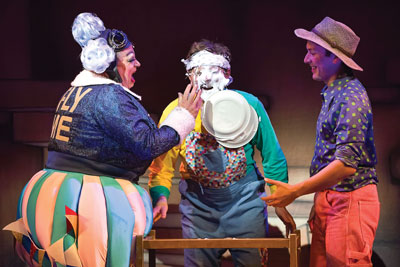
by Ellie Harman
Yvonne Arnaud Theatre, Guildford
Now the autumn term is in full swing, attention is beginning to turn to Christmas and how to keep the whole family occupied over the festive break. A trip to the panto is an institution for many families and school groups, and for some, Christmas would not be Christmas without this quintessentially British tradition. Panto is often the first experience of theatre as a child, and an experience that will often stick with someone for the rest of their life.
Pantomime has its roots in Italy and Ancient Greece, evolving from the Italian ‘Commedia dell’Arte’ which originated in the 16th century. These performances featured masked characters, slapstick style comedy, music and acrobatics, all of which are familiar aspects of today’s pantomime. But, whilst present-day pantomime performances are always jam-packed with eccentric, colourful characters, singing, dancing and quick-witted humour for children and adults alike, watching a panto has life-long benefits for young people.
Studies have proven that children who visit theatres when they are young are more likely to continue engaging with live theatre throughout their lives, which in turn has been proven to improve mental health. A recent survey by Norwich Theatre found that by seeing a pantomime at Christmas, the survey respondents experienced a significant boost in their mood, with over 80% feeling happier after the performance. Arts engagement more generally has been shown to enhance positive mental health and life satisfaction. The international children’s charity UNICEF suggests that “Dancing and singing are great ways to relieve stress. When you’re enjoying fun moments and laughing together, your body releases endorphins that promote a feeling of wellbeing.”
Pantomime is also a great introduction to the theatre and gives children the chance to learn the etiquette of public spaces in a more relaxed environment than a traditional play. The unique nature of a pantomime encourages children to get involved in the fun, singing along and shouting out “He’s behind you” and “Oh no it isn’t” at every possible opportunity. In a world that’s increasingly screen-based, the opportunity for young people to express themselves in a safe environment is invaluable for developing social skills, building self-esteem and making sense of the world.
Many people may see a trip to the panto as just a treat rather than a learning experience, but at the core of every pantomime is a heart-warming moral lesson too. Robin Hood, for example, tells a story of being courageous, standing up for injustice and helping those less fortunate than ourselves. Pantomime producers also often incorporate current topics and issues into the show, so as well as joyful entertainment that honours the traditional art form, pantomimes can also raise awareness of the challenges we may face. Teaching children these stories in a creative way not only helps develop their character but also widens their scope of ways to learn in the future, cultivating their creative mind-sets and all the while bringing joy and lasting festive memories.
Many children are visual learners, so pantomime provides a fantastic visual representation that they are more likely to remember. Dr Natasha Kirkham from Birkbeck University found that experiencing a story on stage rather than viewing it on a screen leads to a deeper understanding of the content. Similarly, a study by the University of Arkansas found students get significant educational benefits from seeing live theatre as opposed to watching a film, including improved vocabulary, and greater knowledge of the content. Representation matters, and diverse, inclusive casts, that represent the communities for which they are performing is important. For children, to see people on stage that look like them can be inspiring, empowering and confidence boosting.
This Christmas, many theatres are ensuring nobody is left out of the festivities by offering ‘relaxed performances’. Relaxed performances are adapted in several ways to make them more comfortable for people with Autism or learning difficulties, or who may benefit from a calmer environment. It’s also perfect for very young children who haven’t been to the theatre before. Adaptations to the performance include keeping the main lights on throughout the performance, allowing audience members to come and go as they please, providing a quiet break-out room, adjusting light and sound levels and removing audience interaction from the show. Many theatres have British Sign Language interpreted performances for deaf audience members, and a Dementia Friendly performance, so the whole family can enjoy the show.
So, at a time when the pressures put on young people are perhaps greater than ever, why not consider a trip to the theatre this Christmas? Pantomime provides a chance for children to come together with all generations to see a live show which will make everyone laugh and feel happy, inspire imaginations and encourage the next generation of performers and audiences.
The magic of pantomime is something the whole family can enjoy and at the Yvonne Arnaud Theatre, Guildford it’s always wonderful to see multi-generational families in the audience. The theatre has lots of upcoming family shows so please visit www.yvonne-arnaud.co.uk to find out what’s on.











